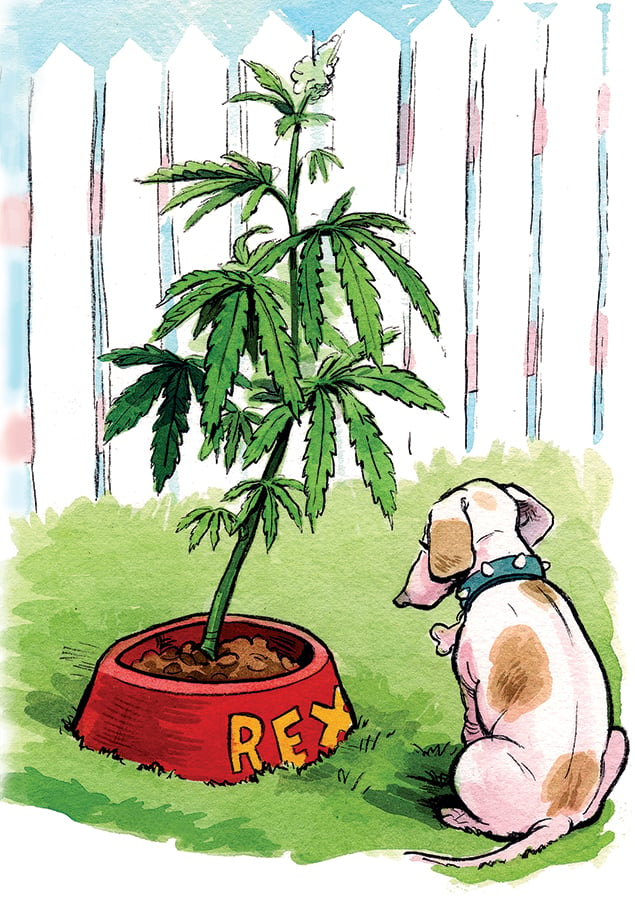At first blush, the idea of a pot-smoking dog sounds like a joke, a parody from an age where prohibitions are dwindling and pet indulgence is growing. But savvy pet-goods marketers surely know better. After all, as modern America’s humans embraced acupuncture, organic diets, and behavioral medications, they quickly started shelling out for the veterinary variety on behalf of their dogs and cats. It was only a matter of time before medical marijuana—now legal in 23 states and DC—jumped across species to become a treatment option for animals that, just like people, suffer from arthritis, cancer, pain, seizures, and anxiety.
Though they aren’t government-regulated and haven’t been widely studied—and the American Veterinary Medical Association hasn’t taken a stance on the matter—many owners insist the cannabis-based treatments now available for animals alleviate their pets’ ailments when traditional medicine doesn’t.
Mike Mulloney of Elkridge is among them. He got the devastating news about his pit-bull mix, Jake, last July when, after a routine checkup, the dog’s lab results revealed he had an aggressive form of blood cancer called hemangiosarcoma. Jake had a month to live, maybe two, the vet said.
Eight months later, Jake isn’t just alive—Mulloney says he’s still able to enjoy life: “He gets excited to go for walks. Still gets excited when the mailman or the trash man comes, still barks when someone comes to the door.”
Mulloney believes the cannabis supplements he’s given Jake since August, along with a strict nutrition plan, are to thank for sustaining the dog’s quality of life and slowing the cancer’s progress. The supplements, called Canna Companion, were recommended for Jake by holistic veterinarian Scott Sanderson, who practices in Columbia. “People want to use [cannabis] because it works,” says Sanderson.
Not all vets share his enthusiasm.
“We just don’t know enough to be able to safely say whether such products are effective,” says veterinary oncologist Conor McNeill, who practices at the Hope Advanced Veterinary Center in Vienna. Sarah Sheafor, chief of oncology at VCA SouthPaws in Fairfax, emphasizes that the quality of the supplements and how they interact with other medications are untested. Others, such as Leesburg veterinary neurologist David Brewer—who does periodically recommend cannabis-based treatments to patients—place some stock in anecdotal success stories like Mulloney’s.
At least one thing is certain: The pet products on the market differ significantly from the type of marijuana that humans smoke for fun, which is why they’re legal even in places where marijuana is not. Canna Companion and Canna-Pet—both supplements in capsule form—are produced with industrial-grade hemp, a strain of the plant that contains only trace amounts of THC, the substance that gets people high.
To give animals any other form is dangerous and even lethal, says Tina Wismer, medical director of the Poison Control Center at the American Society for the Prevention of Cruelty to Animals. In 2013, her organization fielded 352 calls related to pets ingesting pot. The queries range from comedic (a cat in Illinois lapping up a small, ultimately harmless amount of marijuana-infused lasagna) to serious (a border collie in DC that had to be medicated and rehydrated at the vet after scarfing down a marijuana-laced brownie, especially toxic because of the chocolate).
In contrast, Wismer says the cannabis supplements are unlikely to do any harm, though she does offer a warning: “Issues would arise if the animal ate the entire bottle of pills—which I wouldn’t put past a Labrador.”
This article appears in our March 2015 issue of Washingtonian.














